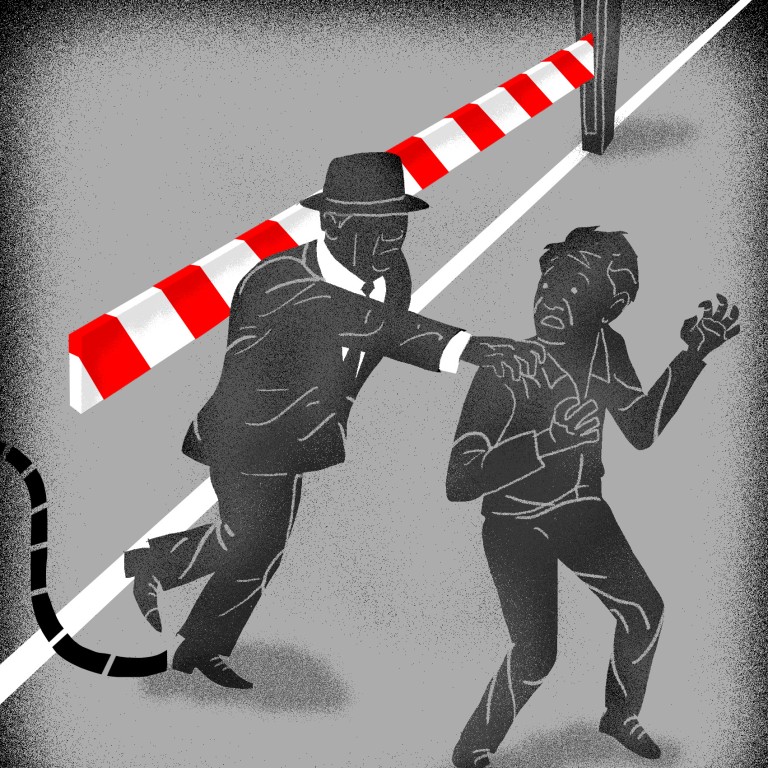
Lee Bo’s case highlights grey areas in Hong Kong’s Basic Law on cross-border criminal investigations
Simon Young says the possible abduction of five Hong Kong booksellers shows Hong Kong needs a new legal framework to ensure transparency and protection of rights in cases involving mainland officials

If Lee crossed the border voluntarily and on his own, there would be no Basic Law issue. If private individuals unconnected to the mainland government were involved in forcing or persuading Lee to cross the border then, again, it is difficult to see this as a constitutional crisis, even though such individuals may have committed ordinary crimes.
READ MORE: China finally confirms it has detained Hong Kong bookseller Lee Bo after his Swedish associate is paraded on state television
There are a number of indications, however, that mainland officials were implicated in Lee’s entry. First there are Lee’s statements that he is “assisting an investigation” on the mainland. The nature of the books sold by Lee’s bookstore, coupled with the disappearances of his four associates, suggest a criminal investigation into offences of spreading rumours or slander to subvert state power or other national security offences.

Even if mainland officials were involved, this does not necessarily mean the Basic Law was breached because there are grey areas when it comes to cross-border criminal investigations.
Certainly an abduction and forced rendition by mainland officials would constitute a serious infringement of the “one country, two systems” principle, but there are multiple ways to cause someone to cross the border. A chat in a cha chaan teng, a phone call or a text message may be all that is needed to incite a person to make the trip.

There is no consensus as to whether ‘luring’ a suspect to enter the arresting state is a violation of international law
In Hong Kong, the issue must be considered under the framework of the Basic Law. According to the chief executive’s January 4 statement, “only legal enforcement agencies in Hong Kong have the legal authority to enforce laws in Hong Kong”.
But the position is more nuanced as reflected in the secretary for justice’s qualified remarks at the opening of the legal year: “Except properly permitted under our laws, neither unauthorised criminal investigation nor unlawful arrest within the jurisdiction by anyone or any authority shall be tolerated”.
The key word is “unauthorised”. Under the Basic Law, specific mainland offices are authorised to carry out official duties in Hong Kong. The three main offices are the liaison office, the ministry of foreign affairs and the People’s Liberation Army.

The liaison office has an open-ended function to undertake “other tasks” assigned by the central government. China’s National Security Law, passed in July 2015, provided that Hong Kong had responsibilities to preserve national security.
So long as such officials comply with local law, it is arguable that monitoring for national security is a function incidental to their respective liaison, foreign affairs and defence roles.

Another murky area is the use of Hong Kong residents by mainland entities to conduct surveillance
The position is less clear for those already stationed here. Can they conduct as much surveillance as any private resident under the law? Does the surveillance have to be within the scope of their authorised official duties? Does that extend beyond national security, defence and foreign affairs?
Another murky area is the use of Hong Kong residents by mainland entities to conduct surveillance for mainland investigations. Should such individuals be subject to greater duties under the law, given constitutional rights to privacy?
A proper legal regime in this area would need to start with the position that no mainland official, whether stationed or not, shall conduct any criminal investigation in Hong Kong unless the Hong Kong government has provided informed consent to the investigation.

In deciding whether to give consent, the government would need to consider a number of matters including the ability of Hong Kong authorities themselves to investigate and share the information, whether it concerns central or local affairs, likely respect for Hong Kong laws and individual rights, and the seriousness of the matter.
Such a regime would hopefully contribute to more public awareness of the work and activities of mainland officials in Hong Kong. An annual report to the legislature could be standardised.
In their article on political policing in Hong Kong, Hualing Fu and Richard Cullen noted that the “use of subtle, ideally even undetectable, political surveillance and harassment techniques has proven more effective in silencing dissenting voices than full-blown political prosecutions”.
Assurances of adhering to the Basic Law given by central government officials will provide little comfort if the Basic Law itself does not provide clear guidance.
READ MORE: Experts sceptical at Gui Minhai’s ‘illogical’ surrender
If mainland offices have now become our present-day police “Special Branch”, we need a new legal framework to promote transparency, protection of rights, and mutual legal assistance in cross-border cases, especially those involving political expression.
Professor Simon Young Ngai-man is associate dean (research) in the Faculty of Law at the University of Hong Kong

